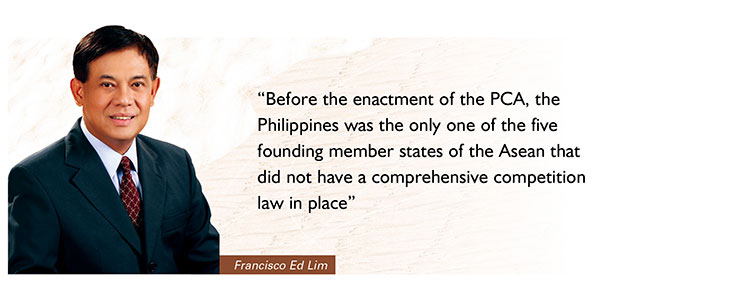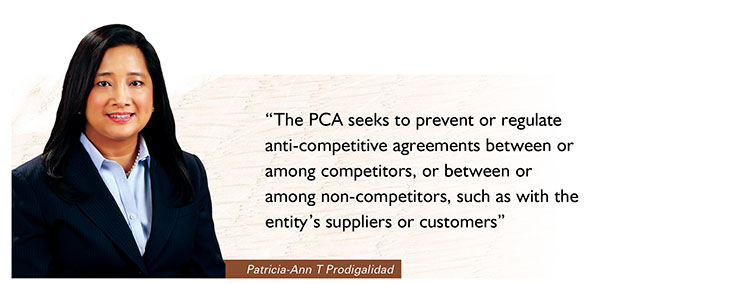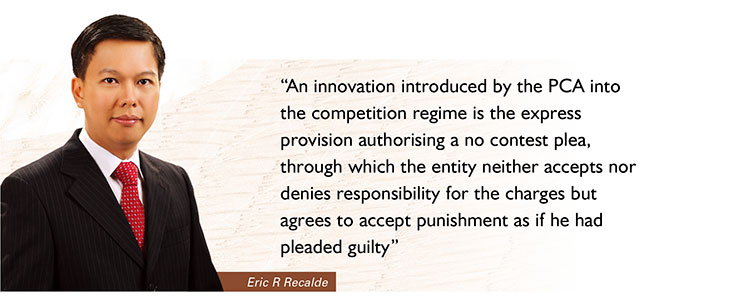Before the enactment of the Philippine Competition Act in 2015, the Philippines was the only founding member of Asean that did not have a comprehensive competition law in place. Francisco Ed Lim, Patricia-Ann T Prodigalidad, Eric R Recalde of ACCRALAW review the new regime.
Background
The 1987 Philippine Constitution mandates the state to “regulate or prohibit monopolies when the public interest so requires. No combinations in restraint of trade or unfair competition shall be allowed.”
In 2015, Congress passed Republic Act No. 10667, or the Philippine Competition Act (PCA). The PCA took effect on August 8, 2015.
The law was enacted in order to boost the Philippines’ readiness for the Association of South-East Asian Nations (Asean) market integration. Before the enactment of the PCA, the Philippines was the only one of the five founding member states of the Asean that did not have a comprehensive competition law in place.
The PCA covers not only domestic transactions, but even international transactions that may have “direct, substantial and reasonable foreseeable effect” on Philippine trade, industry or commerce. It prohibits anti-competitive agreements and conduct that have the objective or effect of substantially preventing, restricting or lessening competition. It also provides for a mandatory and suspensory merger notification regime.
The basic operational principles underpinning the law are as follows:
- The primary goal of the PCA is to protect competition, not necessarily competitors or consumers;
- An act having foreclosure effect is presumed to have exploitative effect;
- The Philippine Competition Commission (PCC) has the burden to establish the act has foreclosure effect;
- An act may have exclusionary effect but without exploitative effect;
- An act may have exploitative effect but without exclusionary effect; and
- The entity has the burden to establish that the act has neither exploitative nor exclusionary effect.
PCC and its powers
Tasked with the duty to implement the country’s competition policy is the PCC, an independent quasi-judicial body and an agency attached to the Office of the President. The PCC is composed of a chairperson and four commissioners, all of whom have fixed terms and enjoy security of tenure.
The PCC has a wide array of functions including rule-making, advisory, policy formulation, public education and compliance monitoring. It is also vested with original and primary jurisdiction over the enforcement and implementation of the provisions of the PCA and its implementing rules and regulations (IRR), and for this purpose, is authorised to exercise, among others, the following salient powers and functions:
- Conduct inquiry, investigate, hear and decide cases involving any violation of the PCA and other existing competition laws, whether on its own initiative or upon verified complaint, as well as institute the appropriate civil or criminal proceedings;
- Review proposed mergers and acquisitions, determine thresholds, requirements and procedures for notification and, thereupon, prohibit mergers and acquisitions that have anti-competitive effects;
- After due notice and hearing and upon finding, based on substantial evidence, that an entity has entered into an anti-competitive agreement or has abused its dominant position, to issue injunctions, require divestment and disgorgement of excess profits or apply such other remedies to stop and redress such anti-competitive behaviour;
- Conduct administrative proceedings, impose sanctions, fines or penalties for non-compliance with the PCA and its IRR;
- Issue subpoenas, summon witnesses, administer oaths and issue interim orders such as cease-and-desist orders (CDOs);
- Upon order of the court, undertake inspections of business premises and other offices, land and vehicles where it reasonably suspects relevant documents relating to any investigation are kept;
- Issue adjustment or divestiture orders including orders for corporate reorganisation or divestment under certain parameters and in accordance with prescribed procedures;
- Intervene or participate in administrative and regulatory proceedings requiring considerations of the PCA and initiated by government agencies such as the Securities and Exchange Commission, Energy Regulatory Commission and the National Telecommunications Commission; and
- Act as the official representative of the Philippine government in international competition matters.
 Anti-competitive agreements The PCA seeks to prevent or regulate anti-competitive agreements, between or among competitors (horizontal agreements) or, between or among non-competitors, such as with the entity’s suppliers or customers (vertical agreements).An “agreement” refers to any type or form of contract, arrangement, understanding, collective recommendation or concerted action, whether formal or informal, explicit or tacit, written or oral.Agreements are anti-competitive if the following elements are present:
Explicit violations include the fixing of prices, components thereof, or other terms of trade, and bid-rigging. All other violations are subject to the rule of reason test. An entity that enters into anti-competitive agreement will be subject to criminal and civil liabilities. Other violations are subject only to administrative fines and civil liabilities. Abuse of dominance
The term “conduct” may refer to an action, practice or undertaking. Note that both the definitions of “conduct” and “agreement” include the terms “collective recommendation” and “concerted action”. The difference is that in agreements, there must be an understanding between or among the entities towards the accomplishment of a particular objective. As for conduct, the parties appear to act in concert, or have tacit coordination that falls short of an agreement. Tacit coordination may be established by proof of prior exchange of commercially sensitive information, and the effect of such exchange on the subsequent behaviour of the parties. Mergers and acquisitions The Implementing Rules and Regulations provides for two tests: the size-of-person test and the size-of-transaction test.
For proposed acquisition of voting shares of a corporation or of an interest in a non-corporate entity, the reference points are value of the assets/gross revenue of sales in, into or from the Philippines, and the level of control gained in the subject entity:
In joint ventures (other than in connection with mergers and acquisitions), the contributing entities are deemed the acquiring entities and the joint venture is deemed the acquired entity. An acquiring entity shall notify the PCC if:
|
 Enforcement To ensure that the objectives of the PCA and the national competition policy are attained, the PCC is expressly empowered to investigate, decide and, where warranted, impose administrative sanctions against erring entities. As a matter law, the PCC has the sole and exclusive authority to initiate and conduct, based on reasonable grounds, a fact-finding or preliminary inquiry for the enforcement of the PCA and its IRR. Though the inquiry may be initiated through a verified complaint by an interested party or upon referral by a regulatory agency, the PCC may also conduct the inquiry on its own initiative. In the event the inquiry leads to a full administrative investigation, the PCC may, after due notice and hearing, issue CDOs, impose administrative sanctions, file criminal complaints before the Philippine Department of Justice or even institute civil proceedings for violations of the PCA and other competition laws. As mentioned above, the PCC is likewise empowered to require divestment, order disgorgement of excess profits as well as direct other forms of corporate reorganisation.Administrative fines imposable by the PCC for violations of the PCA on anti-competitive agreements, abuse of dominant position, compulsory notification in covered mergers or acquisitions and prohibited mergers or acquisitions range from a fine of up to Ps100 million for the first offence and from Ps100 million up to Ps250 million for the second offence. Other administrative offenses that are punishable with fines are failure to comply with an order of the PCC, supply of incorrect or misleading information and other violations not specifically penalised under the PCA. Notably, the schedule of fines in the PCA shall be increased by the PCC every five years.For violations that are considered criminal in nature, that is, entering into explicit anti-competitive agreements and agreements restricting production and development or dividing markets under Sections 14(a) and 14(b), courts are authorised to sentence the guilty offender with imprisonment of two to seven years and a fine of Ps50 million to Ps250 million. Though the fine is payable by the erring entity or entities, the penalty of imprisonment shall be imposed upon the responsible officers, directors and managerial employees who are knowingly and wilfully responsible for the violation. Whether the fine is criminal or administrative, the same shall be tripled if the violation involves the trade or movement of basic necessities or prime commodities. |
 An innovation introduced by the PCA into the competition regime is the express provision authorising a no contest plea. Under the PCA, entities charged in a criminal proceeding under Section 14(a) and 14(b), may to enter a plea of no contest, through which the entity neither accepts nor denies responsibility for the charges but agrees to accept punishment as if he had pleaded guilty. A no contest plea shall be subject to the court’s acceptance, which shall be given only after weighing its effect on the parties, the public and the administration of justice.Under Section 35 of the new law, the PCC is mandated to create a “leniency programme”, wherein an immunity or reduction of penalties shall be conferred to entities, subject to meeting certain conditions, in exchange for voluntary disclosure of information regarding the subject anti-competitive agreement provided the offer to disclose is made prior to or during the fact finding or preliminary stage of the inquiry. Such programme shall include immunity from any suit or charge, exemption, waiver or gradation of fines and/or penalties giving precedence to the entity submitting such evidence.The PCA also provides for non-adversarial remedies as a means to encourage voluntary compliance with the PCA before the institution of administrative, civil or criminal proceedings. These non-adversarial remedies include consent orders, under which an entity may, prior to the conclusion of the PCC’s inquiry and without admitting a violation of the PCA or any other competition law, submit a written proposal for the entry of a consent order that it is willing to abide by. Among the allowable terms of a consent order are the payment of an amount within the range of fines under the PCA, regular submission of compliance reports and payment of damages to private parties. By express provision of the PCA, any action arising from a violation of any provision of the PCA shall be barred unless commenced within five years from (a) discovery of the violation by the offended party (for criminal actions) and (b) from the time the cause of action accrues (for civil and administrative actions). This is a significant deviation from most regulatory statutes that provide for the imprescriptibility of administrative actions. As to private actions, however, any person who suffers direct injury by reason of a violation of the PCA may institute a separate and independent civil action, but only after the PCC has completed its preliminary inquiry. Decisions of the PCC are appealable to the Court of Appeals in accordance with the Rules of Court. The appeal, however, will not stay the execution of the order, ruling or decision subject of review unless the Court of Appeals shall so direct otherwise. Other than the Court of Appeals or Supreme Court, no other court shall issue any temporary restraining order or issue any injunctive writ against the PCC to restrain the exercise of its duties or functions. By express provision of the PCA, this prohibition applies in all cases, even those instituted by private parties. The sole exception to the prohibition is when the matter is of extreme urgency involving a constitutional issue and the non-issuance of the restraining order will result in grave injustice and irreparable injury to the public. Curative period ––––––––––––––––– |


